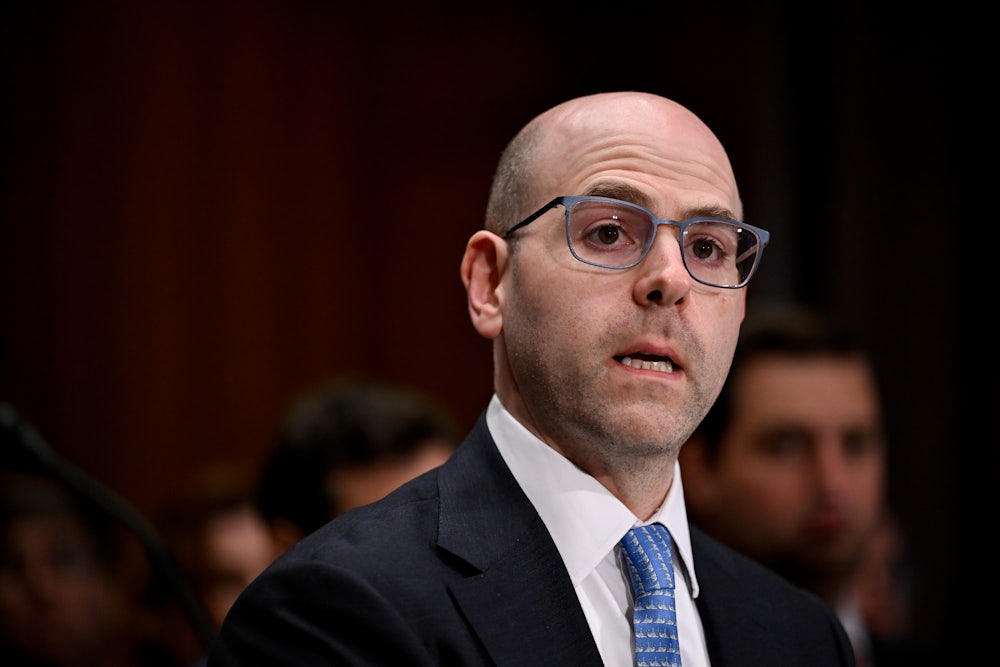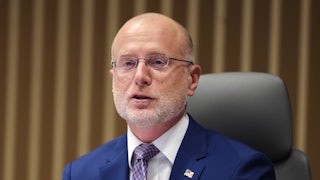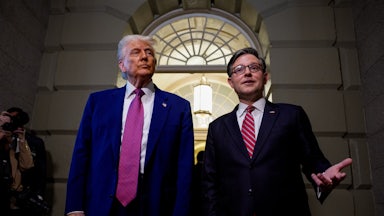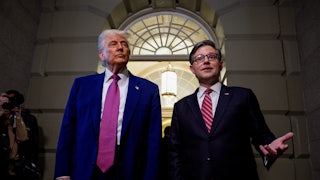Watching Stephen Miran testify Thursday before the Senate Banking Committee on his nomination to be a governor of the Federal Reserve, I found myself wondering whether this Harvard Ph.D. economist was using the word fulsome to telegraph to Donald Trump that, if confirmed, he’ll remain the president’s reliable yes-man.
“I do believe,” Miran said, early in the hearing, “there needs to be a fulsome process at the Fed for thinking about not only the benefits of regulations but the costs as well.”
This came in answer to the rare question that didn’t touch on the senators’ main concern during the hearing—the Fed’s independence from Trump. Rather, the topic was Basel III, an international accord on capital reforms from which, even before the 2024 election, the Fed was backing quietly away because JP Morgan Chase chief executive Jamie Dimon doesn’t care for them.
Miran’s views on Basel III needn’t concern us here. But Miran’s use—or perhaps misuse—of the word fulsome intrigues me because for centuries fulsome was associated with the word foul and meant “too much,” especially with respect to praise; fulsome praise meant “sycophancy.” By the late twentieth century, though, so many ignoramuses used fulsome to mean “abundant” that the dictionaries cried uncle and approved both definitions.
Fulsome’s conflicting definitions have proved so confusing that Webster’s recommends avoiding the word. “The chief danger for the user of fulsome,” the dictionary warns, “is ambiguity.” But of course ambiguity is mother’s milk to a nominee testifying before Congress. So perhaps Miran said “fulsome” (twice!) to signal to Trump—or, since it’s doubtful Trump knows fulsome’s etymology, to someone close to Trump—that he remains Trump’s devoted slave. Because if anybody thrives on fulsome praise—the more fulsome the better—it’s Trump.
Miran’s fulsome tendencies were the main subject of inquiry at the hearing. Invited early on by the committee’s Republican chair, Senator Tim Scott of South Carolina, to assert his independence, Miran said that if confirmed, “I will act independently, as the Federal Reserve always does, based on my own personal analysis.” But he added: “I’m always happy to hear views from every source possible.” That made it sound as if Trump were just one of many people—taxi driver, bartender, president—who might disagree with Miran about interest rates and, by golly, deserved a fair hearing. Later, Miran said that “the president is entitled to a view on appropriate monetary policy as is everyone else with an interest in the subject, and I welcome everyone sharing their views.” He said it was a welcome opportunity to “interrogate” his own presumptions, sounding almost like a DEI facilitator.
One very large difficulty with Miran’s claim to be independent is that he does not intend to resign his current post as chairman of the Council of Economic Advisers, but rather to go on leave. Miran explained in so many words that if this Fed governorship turns out to be a four-month gig then he might want his old job back. Miran has been nominated to serve out the term of Adriana Kugler, who resigned last month, and to remain he must be renominated and re-confirmed. If re-confirmed, Miran said, he will then resign from his White House job.
Senator Jack Reed, Democrat of Nevada, pointed out that Miran was contradicting a Manhattan Institute paper about reforming the Fed that he co-authored last year. In that paper, Miran said board members “should be prohibited from serving in the executive branch for four years following the end of their term.” That didn’t jibe with Miran returning to chair the Council of Economic Advisers.
It wasn’t the only time Miran was called on to explain contradictions between his testimony and what he wrote a mere 18 months ago. Miran also got quizzed about a passage asserting that the president “should voluntarily announce that he will refrain from removing any incumbent board members or Reserve Bank leaders through their terms.”
Whenever Miran got called on any such contradiction, he recited some variation on the following: The paper set forth “a suite of checks and balances, and it’s highly inappropriate to take one check or balance outside the context of the overall package.” (Yes, he actually said “highly inappropriate,” as if this were a matter of constitutional law.) Senator John Warren, Democrat of Virginia, later called bullshit on that by pointing out that the Manhattan Institute paper said, “Our proposal can be implemented in a piecemeal fashion, one policy at a time, if legislatively easier.”
The most entertaining part of the hearing was when Senator Elizabeth Warren, Democrat of Massachusetts, quizzed Miran to determine just how much of a brown-noser he was.
Warren: Did Donald Trump lose the 2020 presidential election?
Miran: Joe Biden was certified by Congress as the president of the United States.
That’s the standard dodge. Warren repeated the question twice more, and Miran repeated his answer twice more.
Warren: Did Bureau of Labor Statistics Commissioner Erika McEntarfer publish fake jobs numbers to manipulate the election, as Trump alleged when he fired her?
Miran: The Bureau of Labor Statistics data on various measures has deteriorated steadily in quality over time.
Warren answered that she didn’t remember Miran complaining about it until Trump got an unfavorable jobs report.
Senator Andy Kim, Democrat of New Jersey, later asked whether anybody in the administration asked Miran to commit himself to lowering interest rates. Miran said no, which almost certainly was a lie.
Senator John Kennedy, Republican of Louisiana, famously disguises his elite pedigree by exaggerating his Southern drawl and reciting cornpone homilies. At the hearing, Kennedy mispronounced the word profligate as “prof-LI-gate,” and for a moment even I considered it might be possible for someone who graduated Vanderbilt magna cum laude and collected a Bachelor of Civil Law degree from Oxford to lollygag his way through life without once hearing somebody pronounce profligate properly. But of course it is not possible.
At the hearing, Kennedy apologized for Warren’s rude questions and asked Miran point blank: “Are you Donald Trump’s puppet?”
“Not at all,” Miran replied. “I’m very independently minded, as shown by willingness to stray from consensus and have out-of-consensus views.”
But Miran proved exactly the opposite when Senator Raphael Warnock, Democrat of Georgia, asked whether the economy would be better off if Trump were able to set interest rates “unilaterally.”
“I think the president has had a series of excellent calls on monetary policy,” Miran replied, before reciting the dutiful catechism that “the independence of the central bank from the political cycle is key to its long-term success.” A more fulsome answer can scarcely be imagined.






